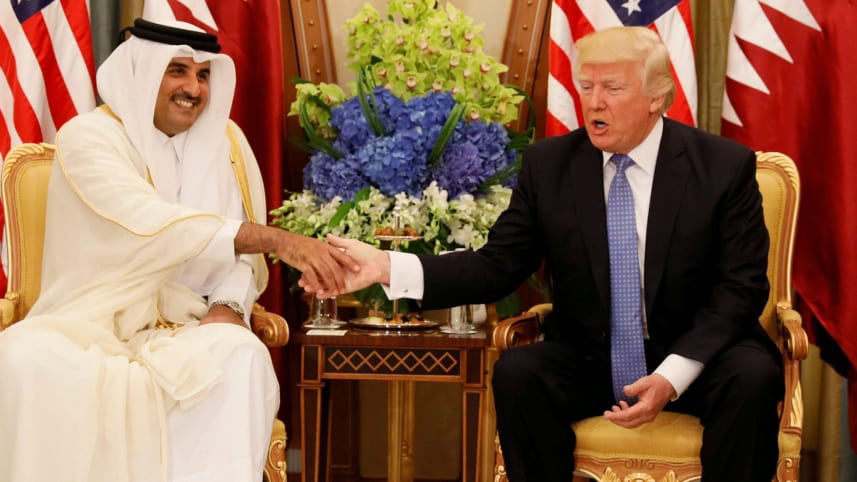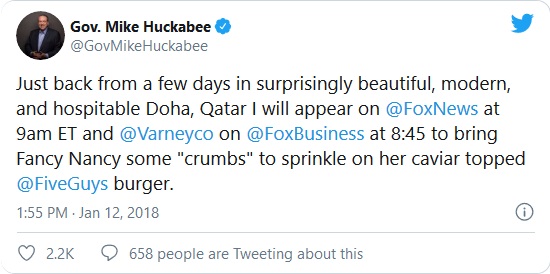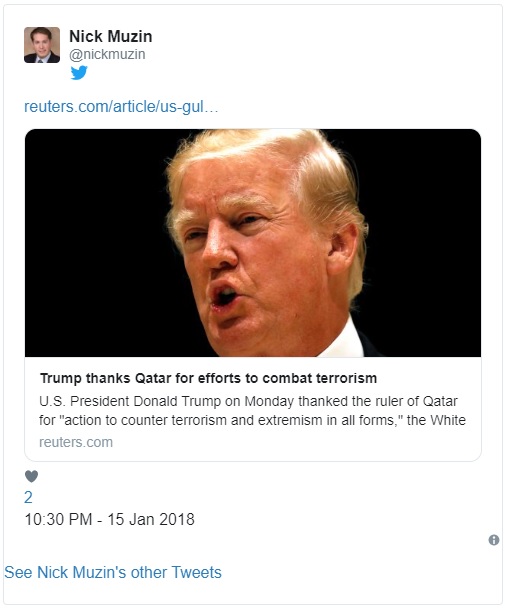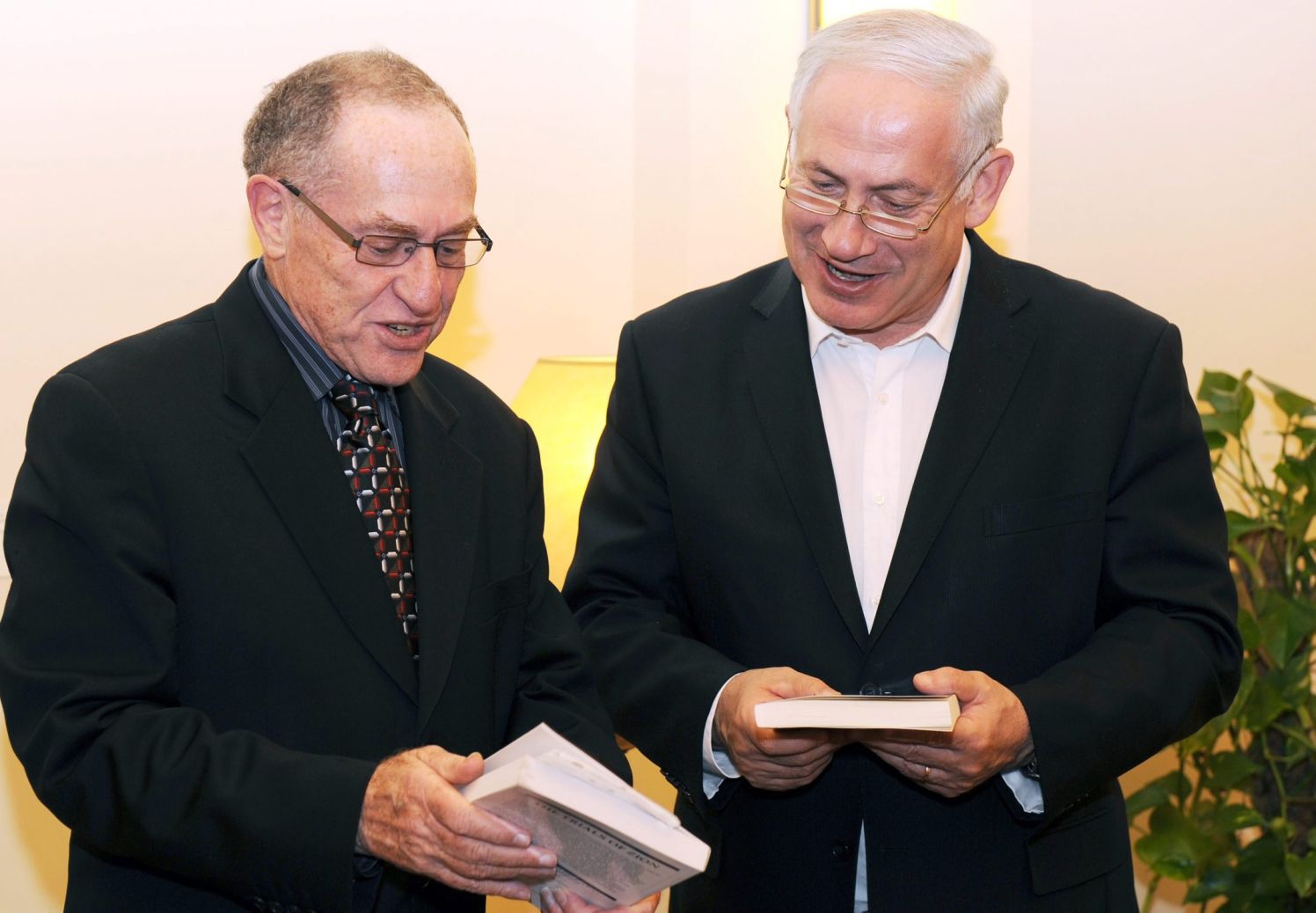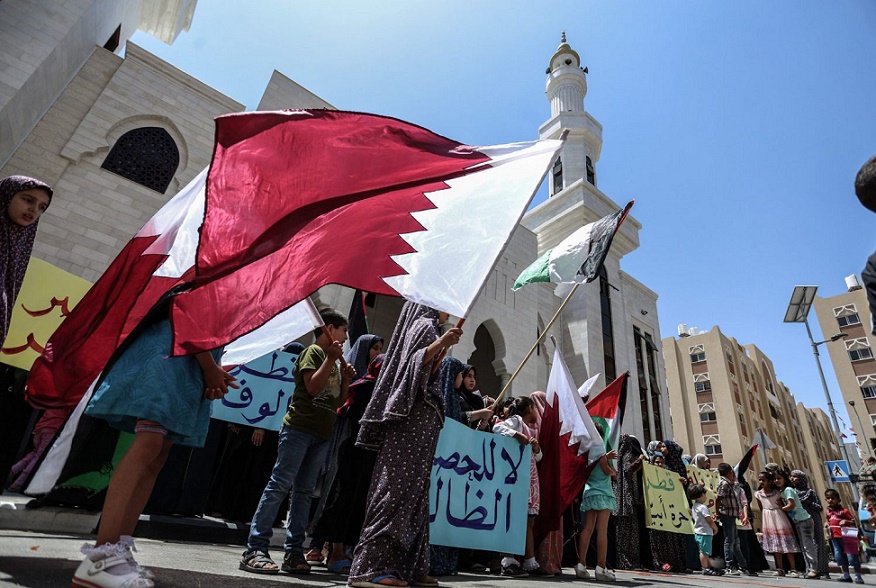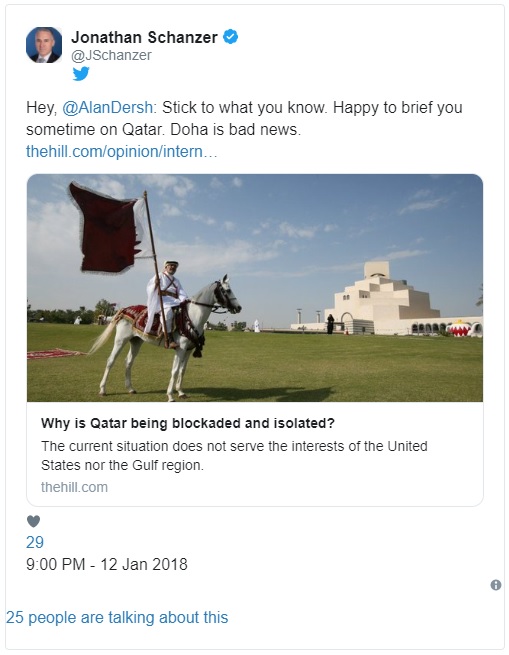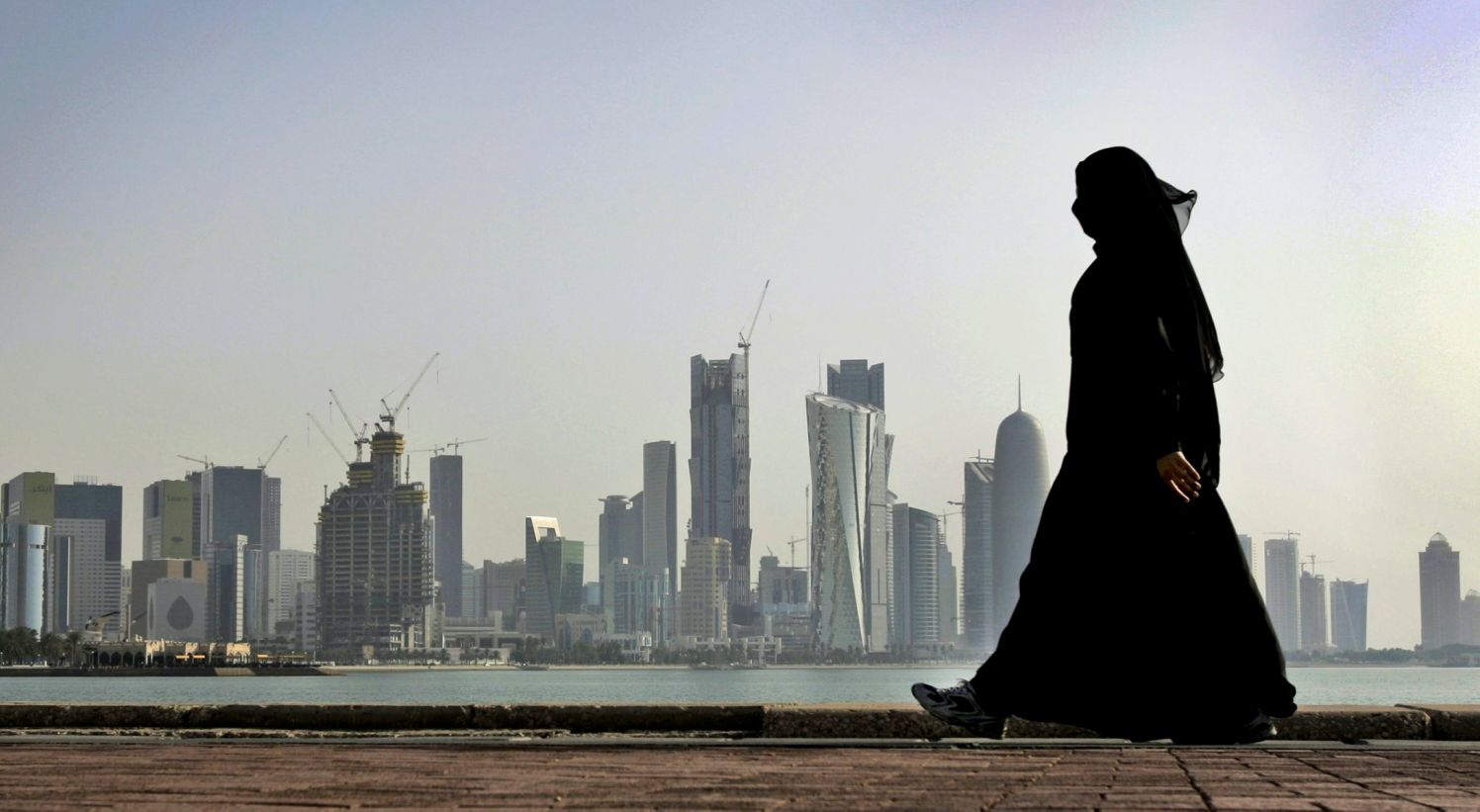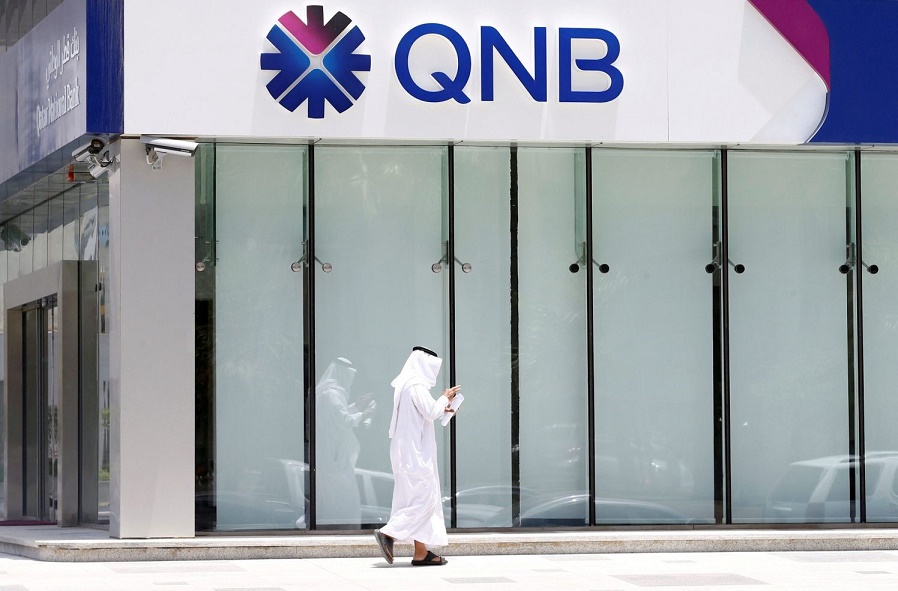Qatar Doubles Down on PR Campaign Appealing to U.S. Jews and D.C. Insiders
A visit to the emirate by Alan Dershowitz, meetings with Jewish organizations and promises of a new attitude toward Israel: Qatar is working hard to change its image as a Hamas-supporting state, but some in Washington remain unconvinced
By Amir TibonHa'aretz, January 20, 2018
Qatar Emir Sheikh Tamim bin Hamad al-Thani, left, shaking hands with U.S. President Donald Trump in Riyadh, May 21, 2017.
WASHINGTON – Qatar has recently expanded its public relations effort aimed at improving its image in the United States, including within the Jewish community.
The wealthy emirate, often criticized for having ties to Hamas, has invited influential American public figures – some of them with close ties to the Trump administration – to visit and meet with its senior leadership, which denies providing support to the Gaza Islamist group and other terror organizations.
Last week, prominent New York attorney Alan Dershowitz published an article on the Hill website, following his visit to Qatar at the invitation of the country’s powerful emir, Sheikh Tamim bin Hamad al-Thani. Dershowitz wrote that he was surprised to hear the Qatari response to many of the accusations hurled at the Gulf state, and urged the Trump administration and Congress to reexamine the issue.
Also last week, Qatar hosted former Arkansas Governor Mike Huckabee, a leading right-wing media commentator and father of White House Press Secretary Sarah Huckabee Sanders. Huckabee tweeted that he found Doha, Qatar, to be “surprisingly beautiful, modern, and hospitable.”
Another recent visitor to the tiny emirate, whose wealth comes from its huge natural gas reserves, was conservative radio host John Batchelor. He took his popular audio show to Qatar last week at the behest of the country’s leadership, where he was joined by Thaddeus McCotter, a former Republican congressman from Michigan.
The emirate has also flown in representatives of various Washington think tanks on Qatar-funded trips.
Dershowitz, Huckabee and Batchelor all seem to be visiting as part of the Qatari leadership’s efforts to change its reputation among American politicians as a “problematic” nation associated with its support for Hamas and the Muslim Brotherhood. Qatar hosts some of Hamas’ senior leaders and funds the international media network Al Jazeera, whom neighboring Arab countries have accused of supporting Islamist movements and of destabilizing their regimes.
As part of the attempt to push back against these allegations, Qatar has hired the services of Nick Muzin, a public relations adviser who previously worked as a senior staffer to Republican Sen. Ted Cruz.
An Orthodox Jew, Muzin has used his contacts within the Republican Party and the Jewish community to find an ear for Qatar’s arguments in Washington and New York – at a time when the emirate is facing a severe crisis because of attempts by Saudi Arabia to isolate it economically and diplomatically.
When Qatar’s hiring of Muzin’s Stonington Strategies firm was first revealed last summer – for a reported monthly fee of $50,000 – it raised eyebrows in Jewish and conservative circles because of Muzin’s professional background. Cruz, his former boss, has called for the Muslim Brotherhood to be designated a terrorist organization, yet Qatar is considered a major Brotherhood supporter in the Arab world.
Who are the good guys?
Muzin’s first attempts to organize meetings for the Qatari emir and crown prince with Jewish-American leaders ran into public opposition and became a source of debate in the Jewish press. Fast forward a few months, though, and it seems the Qatari public outreach effort is slowly beginning to change some minds in Washington and elsewhere.
Dershowitz’s article – titled “Why is Qatar being blockaded and isolated?” – is a good example, especially in light of the author’s reputation as a staunch supporter of Israel.
He wrote he had “just returned from a private visit to Qatar, at the invitation of and paid for by the Emir. I do not represent Qatar’s government and, to be honest, I was initially reluctant to accept his invitation because I had heard that Qatar was contributing to Hamas, which is a terrorist group, and that it was supporting Iran, which is the largest exporter of terrorism in the world. But then I did my own research and concluded that the Qatar issue was more complex and nuanced. So I wanted to see for myself.”
Alan Dershowitz, left, with Israeli Prime Minister Benjamin Netanyahu in 2010.
One of the first things that surprised him, Dershowitz wrote, was that as soon as he got to Doha, Qatar’s capital, “I was surprised to read that an Israeli tennis player had been welcomed by the Qatari government to participate in a tennis tournament.” Dershowitz compared this recent event to Saudi Arabia’s refusal last month to allow Israeli chess players to attend the world chess championship held in Riyadh. “Moreover,” he added, “Saudi officials criticized Qatar for allowing an Israeli tennis player to participate in its tournament, and for ordering ‘the Israeli flag to be raised.’”
“This episode,” he concluded, “made clear to me that the Saudis were not necessarily the good guys in their dispute with Qatar.”
After going over Qatar’s reaction to allegations that it supports Hamas and other terror organizations (allegations that Qatar’s leadership denies), Dershowitz wrote: “After hearing these different accounts, I observed that Qatar is quickly becoming the Israel of the Gulf States, surrounded by enemies, subject to boycotts and unrealistic demands, and struggling for its survival. I heard a lot of positive statements regarding Israel from Qatari leaders as well as hints of commercial relationships between these isolated nations.”
In a conversation with Haaretz on Tuesday, Dershowitz emphasized that he has “not come to any firm conclusions” about Qatar’s ties to Hamas, Iran and other problematic actors in the region. He did, however, leave the emirate with “somewhat more nuanced” views, as “there appear to be two sides to the story.”
A group of Palestinian women holding Qatar flags and banners during a pro-Qatar demonstration in Khan Yunis, Gaza,
June 14, 2017. The gulf state's support of Hamas remains a big stumbling block.
Dershowitz explained that he asked the emir and other senior Qatari officials to assist with the release of two Israeli citizens currently being held in Gaza, as well as the return of the bodies of two slain Israeli soldiers, Oron Shaul and Hadar Goldin, killed in action during the 2014 Gaza war. “They told me they’re trying,” he said, stopping short of providing more details on the sensitive subject.
Coincidentally, on Monday – shortly after the publication of Dershowitz’s article and the culmination of Huckabee’s Qatar visit – U.S. President Donald Trump talked with the emir by phone. A White House readout of that conversation stated: “The President thanked the Emir for Qatari action to counter terrorism and extremism in all forms, including being one of the few countries to move forward on a bilateral memorandum of understanding.” It continued: “The leaders discussed areas in which the United States and Qatar can partner to bring more stability to the region, counter malign Iranian influence, and defeat terrorism.”
One person unmoved by Dershowitz’s article was Jonathan Schanzer, vice president of the D.C. think tank Foundation for Defense of Democracies. He has written extensively in recent years about Qatar’s ties to Hamas and other terror organizations. “Stick to what you know,” Schanzer tweeted Dershowitz. “Happy to brief you sometime on Qatar. Doha is bad news.” And in a subsequent tweet, Schanzer added: “The man [Dershowitz] defends Israel until he’s blue in the face and then normalizes Hamas’s top patron.”
Dershowitz responded, “Happy to hear facts. Not conclusions. I make up my own mind based on facts.”
Schanzer told Haaretz on Wednesday that “there is nothing wrong with analysts and intellectuals traveling to Qatar to learn about the situation there. The problem is that during those visits, they’re not hearing the other side of the story. They are getting the government line and then they go home. They need to hear also from Qatar’s critics. There is a lot of material they should become aware of about Qatar’s ties to Hamas, Al-Qaida, the Taliban, the Muslim Brotherhood and other problematic actors.”
Schanzer previously called to designate Qatar as a state sponsor of terrorism for its ties to these groups. “If you really want to see all sides of the story,” he told Haaretz, “you’re not going to get it in Doha.”
The problem with Qatar
Qatar is not only inviting opinion formers to Doha – it is also working to bring its arguments to Washington. Last week, the Qatari minister in charge of aid and assistance to Gaza, Mohammed al-Emadi, visited the U.S. capital, where he met with, among others, members of Congress and diplomats. Emadi came to Washington partly because he is the rare example of an Arab diplomat who, according to press reports, works on a regular basis with Israeli security officials as part of Qatar’s efforts to help reconstruct the Gaza Strip following the 2014 war. By presenting him to decision-makers and influencers in the U.S. capital, the emirate is hoping to convince them it has a positive impact in Gaza and is working with Israel to improve the situation there.
“The frustration with Qatar,” said an Israeli official who asked not to be identified because of the sensitivity of the issue, “is that they do some good things in Gaza. But at the same time, there are problems arising from their use of Al Jazeera and their ties with Hamas. It’s a complicated situation. They are one of the only countries in the world that truly cares about improving the situation in Gaza. They’re also one of the only countries that has ties to all the bad guys in the region – Hamas, Sunni Islamists and Iran.”
A Qatari woman walking in front of the city skyline in Doha, Qatar.
Zionist Organization of America President Morton Klein told Haaretz that he has discussed Qatar’s policies with Muzin, whom he has “known and worked closely with for a number of years – ever since he was an important staffer for Sen. Cruz.” Last September, Klein refused to meet with the Qatari leadership, accusing the regime of funding “Islamic terrorists who aim to murder Jews, Americans, Christians and even fellow Muslims.”
This week, though, Klein said that while he still has many doubts about Qatar’s role in the region, he is open to hearing the arguments being fleshed out by Dershowitz and others. “I think Dershowitz’s article was totally reasonable,” Klein said. “I think we should check out their claims. If they’re true, then there’s no reason not to go there and engage in dialogue with them. But if they’re lying, then we should have nothing to do with them.”
Klein added, though, that Qatar has to stop airing incitement on Al Jazeera if it ever wants to win the trust of the United States and Israel.
With regards to his conversations with Muzin, Klein said the PR maven “made it clear to me that he wouldn’t take on the job of working for Qatar unless he was assured by the leaders of Qatar that their goal is to make Qatar a more free and civilized society, and to do something about the problems with Al Jazeera.”
Qatar still faces significant criticism on Capitol Hill. Last October, two Republican members of Congress published an article titled “It’s Up to Congress to Hold Qatar Accountable.” Reps. Dan Donovan and Brian Fitzpatrick – both members of the House Foreign Affairs Subcommittee on the Middle East and North Africa – wrote that “Qatar is the master of playing all sides. The same country that served as the U.S. Central Command headquarters during the invasion of Iraq and still hosts a critical American air base today also sponsors Hamas’s anti-Israel agenda, gives sanctuary to terrorist leaders and spreads its wealth to terrorist and extremist groups throughout the Middle East.”
In November, a Democratic consulting firm, Bluelight Strategies, which has also worked with Qatari opposition leaders opposing the country's regime, circulated a political memo among Democrats in Congress urging them to attack Republicans and the Trump administration for turning a blind eye to Qatar's ties with Hamas and other terror groups. The memo, titled "Emerging GOP Vulnerability on Terrorism, Iran and Israel," highlighted the Trump administration's confusing policy regarding the Gulf crisis, and urged Democrats to speak out on the issue: "The more the Trump administration and Congressional Republicans are called out for embracing Hamas state sponsorship of terrorism, the more the message will penetrate."
This view of Qatar as a country that tries to have it both ways is still prevalent in Washington and, as of now, it remains the main challenge standing in the way of the emirate’s charm offensive.
A man walking past a branch of Qatar National Bank (QNB) in Riyadh, Saudi Arabia, June 5, 2017. Qatar is looking to make
friends in Washington after the Saudis triggered a diplomatic crisis.
|
Races? Only one Human race United We Stand, Divided We Fall |
 |
No time to waste. Act now! Tomorrow it will be too late |
|

























